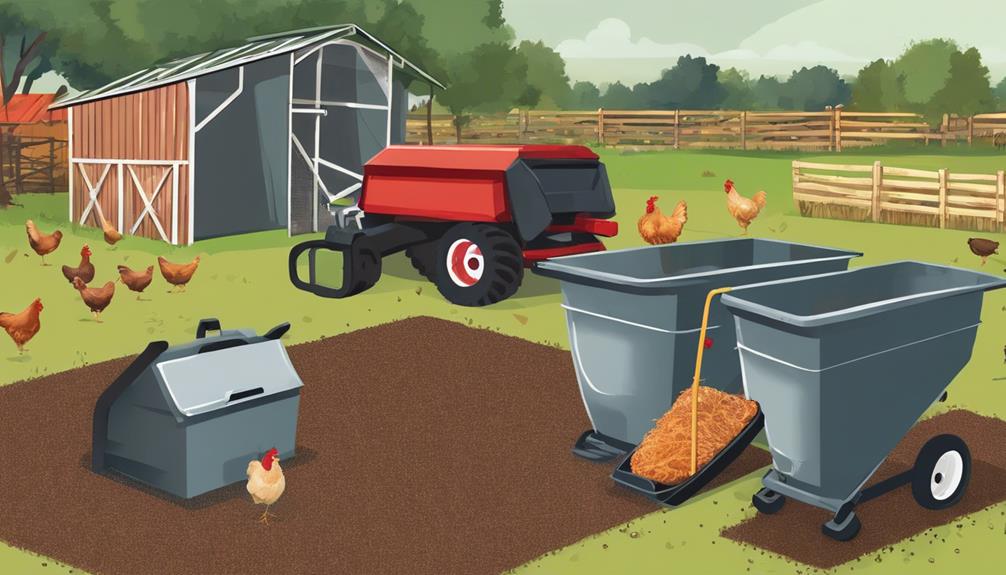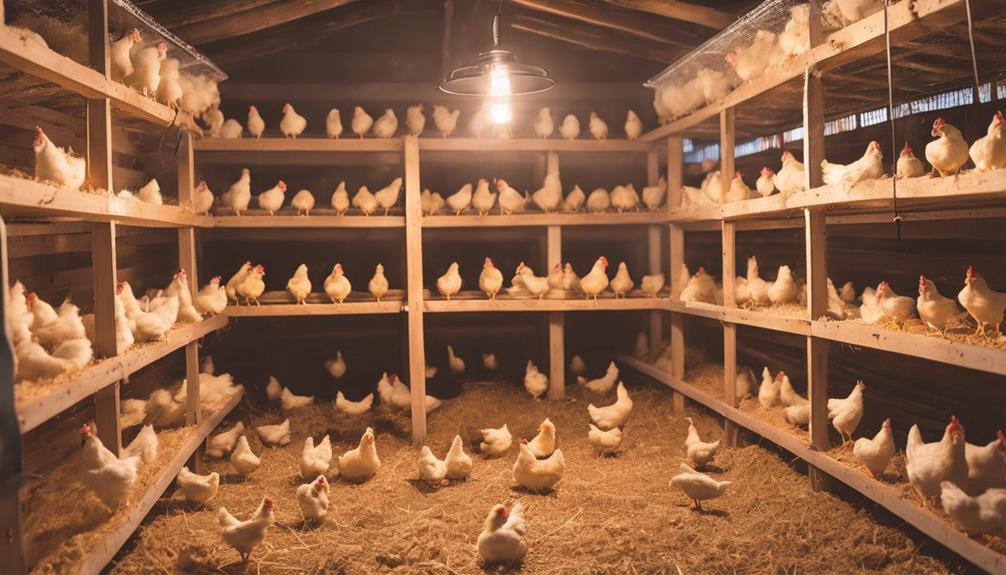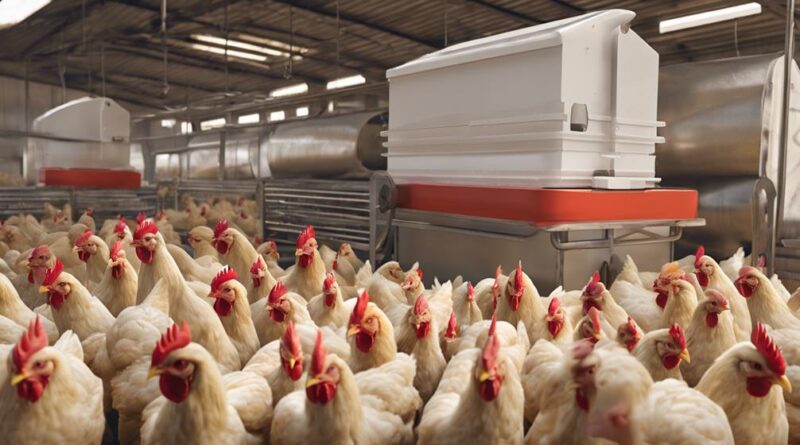Top 10 Essential Chicken Farming Equipment and Technology"
To optimize your chicken farming venture, invest in automated feeders for efficient feeding and reduced wastage. Incorporate climate control systems to regulate temperature, humidity, and air quality effectively. Utilize egg collection machinery to streamline productivity and egg quality. Poultry incubators ensure optimal hatching success with precise temperature control. Ventilation systems are crucial for maintaining a healthy poultry environment. Implement waste management tools, watering systems, brooder equipment, and health monitoring devices to guarantee the well-being and productivity of your flock. These ten essential equipment and technologies are vital for successful chicken farming operations.
Automated Feeders
Automated feeders are indispensable tools in modern chicken farming operations, efficiently dispensing feed to poultry with precision and consistency. When it comes to feeding efficiency, automated feeders offer a level of accuracy that manual feeding simply can't match. These automated solutions ensure that chickens receive the right amount of feed at the right times, promoting healthy growth and maximizing production.
One key benefit of automated feeders is their ability to reduce feed wastage. By precisely controlling the amount of feed dispensed, these systems help minimize overeating and spillage, ultimately leading to cost savings for farmers. Additionally, automated feeders can be programmed to release feed at regular intervals, ensuring that chickens have access to fresh feed throughout the day.
Moreover, automated feeders can be customized to accommodate different types of feed and feeding schedules. Whether you're raising broilers, layers, or breeders, there are automated feeder options available to suit your specific needs. These systems can also be integrated with other technologies, such as weight sensors and monitoring devices, to provide real-time data on feed consumption and bird health.
Climate Control Systems
To maintain optimal conditions for your poultry operation, implementing effective climate control systems is pivotal in ensuring the comfort and well-being of your chickens. Climate control efficiency is crucial in regulating temperature, humidity, and air quality within the chicken coop. The primary components of a climate control system include ventilation, heating, and cooling mechanisms.
Proper ventilation is essential to maintain good air quality and prevent the build-up of harmful gases like ammonia. It also helps regulate temperature and humidity levels. An efficient ventilation system should ensure a continuous flow of fresh air while removing stale air from the coop.
Heating systems are vital, especially in colder climates, to keep the chickens warm and healthy. Insulation plays a key role in preventing heat loss and reducing energy consumption. Utilizing energy-efficient heating methods such as radiant heaters or infrared lamps can help maintain the desired temperature without significantly increasing energy costs.
In warmer climates, cooling systems like fans, evaporative coolers, or misting systems can help lower the temperature inside the coop. These systems need to be designed and positioned strategically to provide adequate cooling without causing discomfort to the chickens.
Optimizing climate control efficiency while minimizing energy consumption is essential for sustainable poultry farming practices. Regular maintenance and monitoring of these systems are necessary to ensure they function effectively and provide a conducive environment for your chickens.
Egg Collection Machinery
Efficient egg collection machinery is a critical component in optimizing productivity and streamlining operations within a chicken farming facility. When it comes to egg grading, advanced machinery plays a crucial role in sorting eggs based on their quality and size. These machines use sensors and weight measurement systems to categorize eggs into different grades automatically. By automating this process, farmers can ensure consistent egg quality and reduce labor costs associated with manual grading.
In addition to egg grading, flock tracking is another essential function that egg collection machinery can perform. By utilizing RFID technology or barcode systems, these machines can accurately monitor individual hens' egg-laying patterns. This data is invaluable for identifying trends, detecting any issues with specific hens, and optimizing overall flock performance. With flock tracking capabilities, farmers can make informed decisions regarding breeding programs, feed allocation, and health management.
Investing in high-quality egg collection machinery not only enhances operational efficiency but also contributes to higher egg quality and increased profitability. By incorporating egg grading and flock tracking functionalities, these machines enable chicken farmers to manage their operations more effectively and make data-driven decisions to improve productivity and maximize yields.
Poultry Incubators
Enhance your chicken farming operations with state-of-the-art Poultry Incubators, crucial for successful egg hatching and chick rearing. When selecting a poultry incubator, consider factors such as efficiency in maintaining optimal temperature control and the size limitations based on your production needs.
Incubator efficiency is paramount for a successful hatch. Look for models with precise temperature control capabilities, as even slight deviations can impact hatch rates. Modern incubators offer advanced features like digital controls and automatic turning mechanisms, ensuring a stable environment for embryo development.
Another critical aspect to consider is the size and capacity limitations of the incubator. Evaluate the number of eggs you intend to hatch per cycle and choose an appropriate-sized unit to accommodate your production goals. Overcrowding can lead to poor airflow and compromised hatch rates, so it's essential to match the capacity of the incubator with your intended hatch size.
Investing in high-quality poultry incubators is a fundamental step towards improving your hatchery operations. By prioritizing efficiency and size considerations, you can maximize your egg hatching success and ultimately enhance the productivity of your chicken farming venture.
Ventilation Systems
When optimizing your chicken farming setup, one key component to focus on is the design and implementation of efficient ventilation systems. Ventilation efficiency plays a crucial role in maintaining a healthy environment for your poultry. Proper ventilation helps in temperature regulation, air circulation, and reducing harmful gases like ammonia.
To ensure ventilation efficiency, consider the layout of your poultry house. Install ventilation systems that can provide adequate air exchange without causing drafts. Balanced air circulation is vital to prevent heat stress in chickens and maintain optimal conditions for growth and egg production.
When designing your ventilation system, take into account energy consumption. Opt for energy-efficient fans and ventilation equipment to reduce operational costs. Proper insulation and sealing of the poultry house can also enhance ventilation efficiency by preventing air leaks.
Regular maintenance of ventilation systems is essential to ensure they function effectively. Clean or replace air filters, check fan blades for debris, and inspect ductwork for any blockages. Monitoring temperature and humidity levels inside the poultry house can help you adjust ventilation settings accordingly.
Lighting Technology
Proper lighting technology is crucial for optimizing the productivity and well-being of your poultry in a chicken farming operation. When selecting lighting equipment for your chicken farm, it's essential to prioritize energy efficiency and cost effectiveness to ensure the overall success of your operation.
Energy efficiency plays a significant role in reducing electricity costs and minimizing environmental impact. LED lighting systems are highly recommended for chicken farming due to their energy-saving capabilities. LEDs consume less power while providing adequate light intensity for the chickens. This technology not only helps in cost savings but also contributes to sustainability efforts on the farm.
In addition to energy efficiency, cost effectiveness is another crucial factor to consider when choosing lighting technology for your poultry. While the initial investment in high-quality lighting systems may seem significant, the long-term benefits outweigh the costs. LED lights have a longer lifespan compared to traditional lighting sources, reducing the need for frequent replacements and maintenance expenses.
Waste Management Tools

Utilizing advanced waste management tools is essential for maintaining cleanliness and hygiene standards in your chicken farming operation. Implementing efficient waste management not only contributes to the well-being of your chickens but also enhances the overall productivity of your farm.
Here are some key waste management tools to consider:
- Composting Solutions: Setting up a composting system can effectively manage organic waste from your farm. Composting not only reduces the volume of waste but also produces nutrient-rich compost that can be used to fertilize the soil, promoting sustainable farming practices.
- Odor Control: Utilizing odor control technologies such as ventilation systems and odor-neutralizing agents can help mitigate unpleasant smells associated with chicken waste. This not only creates a more pleasant environment for both the chickens and farm workers but also reduces the risk of attracting pests and diseases.
- Recycling Waste: Implementing recycling practices for non-organic waste materials can significantly reduce the environmental impact of your farm. Recycling waste such as plastics, metals, and packaging materials promotes environmental sustainability and reduces the overall carbon footprint of your operation.
- Environmental Sustainability: Embracing waste management tools that focus on environmental sustainability is crucial for the long-term success of your chicken farm. By prioritizing sustainable waste management practices, you contribute to the conservation of natural resources and create a more eco-friendly farming operation.
Watering Systems
Implementing efficient watering systems is imperative for optimizing hydration levels and ensuring the health and productivity of your poultry flock. Watering efficiency is key to a successful chicken farm. Traditional watering methods can be labor-intensive and lead to water wastage. To combat this, modern technology advancements offer automatic watering systems that provide a constant supply of clean water to your chickens while minimizing water spillage and contamination.
These automated systems are designed for easy maintenance, ensuring that your flock always has access to fresh water. By incorporating these systems, you not only save time and effort but also promote sustainability by conserving water resources. Additionally, these systems help in preventing waterborne diseases that can affect the health of your chickens.
When selecting a watering system, consider the size of your flock and the layout of your farm. Nipple drinkers, bell drinkers, and drip systems are popular choices that cater to different needs. Nipple drinkers are efficient and prevent water from getting soiled, while bell drinkers are suitable for larger flocks. Drip systems offer precise water delivery, minimizing wastage.
Investing in advanced watering technology not only benefits your chickens but also contributes to the overall efficiency and success of your chicken farming operation. Prioritize watering systems that promote sustainability and ease of maintenance to ensure the well-being of your poultry flock.
Brooder Equipment

To ensure optimal growth and comfort for your young chicks, selecting appropriate brooder equipment is fundamental in providing a suitable environment for their early development. When it comes to brooder equipment, there are several key items you need to consider:
- Heating Lamps: Heating lamps are essential in maintaining the right temperature for your chicks. Make sure to place the heating lamps at an appropriate height above the chicks to prevent overheating or chilling. Monitor the temperature regularly to ensure it stays within the recommended range for the age of your chicks.
- Chick Feeders: Proper chick feeders are crucial for providing easy access to feed for your young chicks. Opt for feeders designed specifically for chicks to prevent wastage and contamination. Keep the feeders clean and regularly filled with the appropriate type of feed for the age of your chicks.
- Brooder Crates: Brooder crates provide a safe and confined space for your chicks to develop without being exposed to potential hazards. Choose crates that are well-ventilated and easy to clean to maintain a healthy environment for your chicks.
- Thermometer and Hygrometer: A thermometer and hygrometer are essential tools for monitoring the temperature and humidity levels within the brooder. Keeping track of these parameters is crucial for ensuring the optimal growth and health of your chicks.
Health Monitoring Devices
For effective monitoring of your flock's health status, incorporating specialized health monitoring devices is crucial in ensuring early detection of any potential issues. Disease prevention is a top priority in poultry farming, and utilizing health monitoring devices can significantly aid in this aspect. These devices can track vital parameters such as temperature, humidity levels, and even behavior patterns, providing valuable insights into the overall well-being of your chickens.
By investing in advanced health monitoring devices, you can enhance production efficiency on your farm. These devices allow you to gather real-time data, enabling prompt intervention in case of any health concerns. For instance, some devices can detect early signs of diseases or infections, allowing you to take proactive measures to prevent widespread outbreaks. This proactive approach not only safeguards the health of your flock but also contributes to maintaining high levels of production efficiency.
Furthermore, health monitoring devices can help you establish baseline health indicators for your chickens, making it easier to identify deviations from normal patterns. This early detection capability can be crucial in preventing minor health issues from escalating into more significant problems that could impact your production output.
Frequently Asked Questions
How Do I Prevent Diseases in My Chicken Flock?
To prevent diseases in your chicken flock, implement biosecurity measures like controlling access, disinfection, and pest control. Vaccinate your chickens against common diseases as per a schedule recommended by a veterinarian. Apply strict quarantine procedures for new birds, and maintain high sanitation standards in the coop and surrounding areas.
These practices are crucial for safeguarding your flock's health and preventing disease outbreaks.
What Is the Best Flooring Material for Chicken Coops?
When choosing the best flooring material for chicken coops, consider the importance of proper insulation to regulate temperature and prevent moisture buildup. Opt for materials like concrete or high-quality wood that are easy to clean and provide good insulation.
Adequate coop ventilation is crucial to prevent respiratory issues and maintain air quality. Ensure proper airflow by incorporating vents and windows in your coop design for healthier and happier chickens.
Can I Use Recycled Materials for Poultry Equipment?
Yes, you can use recycled materials for poultry equipment. Sustainable solutions like repurposing items can be cost-effective and eco-friendly.
DIY innovations utilizing recycled materials for chicken farming equipment are practical and creative. By using recycled materials, you not only save money but also contribute to reducing waste and promoting sustainability in your poultry operations.
Explore various options for repurposing materials to create functional and efficient poultry equipment on your farm.
How Do I Train My Chickens to Use Automated Feeders?
To train your chickens to use automated feeders, start by placing the feeders in their usual feeding area.
Encourage them to approach the feeders by using positive reinforcement techniques like rewards or treats.
Repeat this process consistently until the chickens associate the automated feeders with food.
Over time, they'll learn to use the feeders independently.
This behavioral training method helps in integrating automated feeders seamlessly into your poultry equipment setup.
Are There Any Regulations for Chicken Farming Equipment?
When it comes to chicken farming equipment, regulatory compliance is crucial. Various regulations govern the standards for equipment used in chicken farming.
It's essential to ensure that all equipment meets these standards to maintain the health and safety of the chickens and comply with industry regulations.
Checking for regulatory compliance and adhering to equipment standards will help you run a successful and sustainable chicken farming operation.
Conclusion
In conclusion, investing in top-of-the-line chicken farming equipment and technology is essential for maximizing productivity and ensuring the health and well-being of your poultry.
By utilizing automated feeders, climate control systems, egg collection machinery, and other advanced tools, you can streamline operations and achieve optimal results.
With proper equipment and technology in place, you can effectively manage every aspect of your chicken farm and ultimately increase your overall success in the industry.
